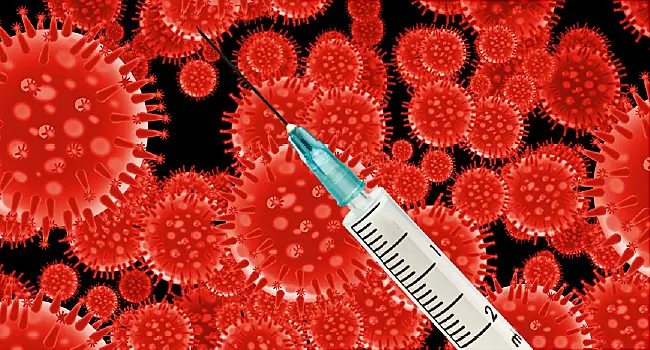Infection or Vaccine for Maximum Effectiveness?
 |
"[The study ended before Omicron took off], and we can't necessarily extrapolate our findings to the situation today.""Obviously, if you have to choose between getting a vaccine versus getting COVID, I would highly recommend going the vaccine route.""But I do think it's an interesting finding [the robust nature of immunity post infection].""I expected to see some level of protection, but personally I was surprised that it was as high as it was."Dr.Jessica Ridgway, infectious diseases specialist, University of Chicago"Vaccination, although imperfect, provides a much more standard level of protection.""When you have an Omicron infection you don't generate really strong immune responses that protect you from subsequent Omicron in the absence of vaccination.""Omicron needs at least three doses of vaccine, because you have to have sky-high levels of antibodies to deal with it. It would be lovely if your third shot gave you zero chance of picking up the infection. But what your third shot does is provide you with a better infection -- shorter, less severe, less likely to develop long-term health consequences.""It's [the most recent study] got inevitably, what we call a survivor bias. Meaning, anyone who died of their first infection is not in the study. It doesn't account for all the people who didn't live to be in this study because of their first infection."Dawn Bowdish, immunologist, McMaster University"The good news is that vaccines still protect very well against severe disease.""We will see large numbers of double and triple vaccinated people getting infected [since the subvariants are ultra transmissible and require high levels of neutralizing antibodies for reinfection prevention]."Dr.Marc-Andre Langlois, molecular virologist, University of Ottawa
COVID-19 infection potentially gives those who are unvaccinated strong, durable protection from reinfection. It can mitigate the disease through allowing for mild infections rather than severe to develop. In short, a new research study gave every indication that 'natural immunity' can produce an infection-aversive effect similar to those reported for mRNA vaccines. That is, it did, with the Delta strain, prevalent in the period of the study, before the advent of the Omicron variant.
The study has been hailed, however, for offering insights into the debate that is ongoing relating to the risk of SARS-CoV-2 reinfection among those who are unvaccinated. People opposed to vaccination believe that natural immunity, gained from infection is superior because it's 'natural', that immunity can be gained as a result of infection. The argument in some quarters is that it makes no difference where immunity is raised from; infection or vaccine.
The study team at University of Chicago viewed data from over 100,000 people who had been tested for COVID in six western American states between 2020 and 2021, with solely unvaccinated people included. It was found that a past infection turned out to be 85 percent protective against reinfection and 88 percent against hospitalization, with no waning of protection up to nine months from initial infection.
In other words, the researchers saw protection levels similar from severe COVID, and mild, whether by 'natural' immunity or immunity gained through a mRNA vaccine. The conclusion fairly well matches a large study conducted between 2020 and 2022 in Qatar, where researchers found natural infection to be associated with stronger, more durable protection against infection, variants aside, than two doses of either Pfizer or Moderna.
Natural immunity "demonstrated hardly any waning in protection for eight months of followup after the primary infection", wrote the researchers, whereas protection gained through vaccines waned with time. following the second dose. Natural infection was seen to be associated with stronger protection against reinfection when the Omicron wave led to a massive increase in reinfections in both groups. Despite which "vaccination remains the safest and optimal tool" against infection and death", they concluded.
"It is natural to become immune through contracting infections, but it is also natural to die from serious infections", wrote the researchers in the Journal of Medical Ethics. The notion that natural infection is somehow 'superior' to vaccine-induced immunity is a "grave mistake and a form of the naturalistic fallacy", they wrote. "It would be prudentially irrational to choose to be infected rather than to have the vaccine, for those who are vulnerable to COVID 19."
Since, obviously, COVID infection can cause grave damage to the heart, lungs, liver, kidneys, and lead to long-term consequences such as long COVID. One study indeed found that one in four people infected with COVID suffer from impaired cognitive function. In addition to which, COVID is increasingly being linked with an incidence of accelerated aging.

"[The study is important, well-designed, confirming recently published work and I don't see an argument] that would favour letting the virus run free, aim for 'natural immunity' through infection of unvaccinated people.""SARS-CoV-2 in unvaccinated people can cause severe pathologies and death, especially in the aging and immunocompromised population, often with long-term consequences.""The only way to lower the negative effects is vaccination and not natural immunity."Dr.Jorg Fritz, immunology professor, McGill University
Labels: 'Natural Immunity', COVID Infection, mRNA Vaccines, Research

0 Comments:
Post a Comment
<< Home